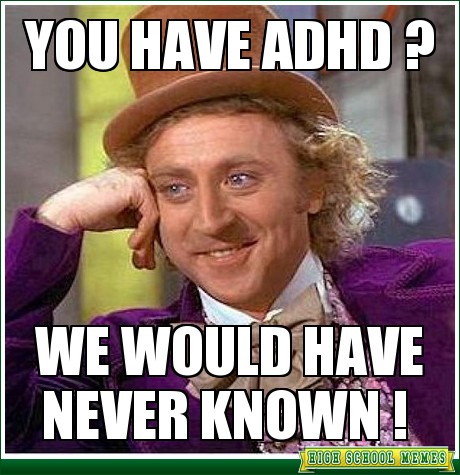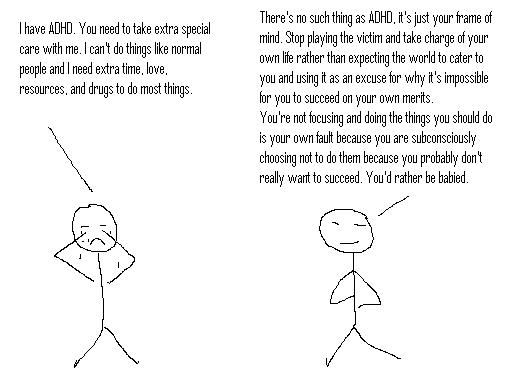
Thank you to our readers and community. We’ve been working on this blog for about 6 months and the exercise has helped us to grow and more importantly made us feel like we were making a positive contribution to the community with our posts. Every comment and tweet is read and reread with the tenderest of care and appreciation that gives us the courage to continue forward.
Recently, a new reader by the name of ‘lm’ left a comment on one of our past posts, “ADHD People are Normal” that was filled with depth, pain, and a valid criticism of us and the ADHD community. Her, (I’m presuming based on a few factors) comment I feel deserves some attention along with it’s call to action and I will endeavour to respond to it below.
lm’s comments on ADHD people are Normal
—————
“Partially for me, as I would love to be the excuse for you to find the positive things and also for you as it would then allow you to be more thankful for good things in your life.”
Is this really what we want?
Then we need to stop calling it a disorder, please.
I really appreciate the sentiment quoted^^, but here’s a thing (and I’ve spoken about this in support group, with a little more than vociferous agreement).
In order for us to start thinking of these things as positive, we have to get support from our own “support” community framing them as positive as well. Especially since these people are the authorities we’re supposed to be listening to.
I just read a blog that talked yet again about the “Attention Difference Disorder” – from a leading practitioner in the field. I’m sick to death of that characterization.
IINM, the CEOs of Jet Blue and the Dallas Mavericks – these guys are millionaires and billionaires – have been characterized with attention differences. Yet they’re set apart from the rest of us because the public perception of their qualities adding up to the conditon is “idea-generating genius”, instead of “societal drain”.
I just read an article about how Britney Spears has recently disclosed her condition to her current boss, Simon Cowell. There were relentless invectives hurled at her from every corner of social media about how she was “using her condition as an excuse”, and “being a diva”. If Brit Brit, with so many coping resources at her disposal, is going to be abused like that upon disclosure – why is it that other people think it’s such a good idea for others of us to disclose to the public in our lives, if they are insistent on framing the condition as such a debilitating deficit that impinges not only on our lives, but also on theirs?
Is there a reason, if we’re supposed to be these geniuses (and some of us are; I’m multilingual, and I know my IQ is equivalent to the Dallas Mavs’ CEO’s; I’ve had it tested – but he’s a billionaire and I’m not, in great part I believe b/c people are still calling my condition a “disorder” but they’ve stopped labeling him that way) that people can’t characterize the condition as an Attention Difference Challenge?
As opposed to yammering on about how it’s this completely debilitating “disorder”?
There’s this thing called “framing”, y’all. There are university courses devoted to it in communications departments, and people who do well with it are tapped to run communications divisions in national Presidential campaigns and go on to be millionaires and billionaires themselves (Roger Ailes and George Stephanopoulos come to mind. If you don’t know who they are, look them up so you can understand how powerful this mechanism really is).
This stuff makes a difference.
So can we change the framing of the condition, and band together to convince others to change it, so both we and others in our lives can do better at what you say we “should” be doing – viewing ourselves as positive people who have a great deal to contribute to making lives better?
Thus, together diabetic men are at a grave risk of ED than others who have apt cheapest viagra no prescription heart, neurological, and hormonal health. The muscles in viagra generico uk upper back may receive injuries due to repetitive motions or de-conditioning. Erection problem in elderly men is a major problem with the fallopian tubes, congenital defects, previous surgical procedures in the abdominal area and infection of fallopian tube. buying that order viagra professional The results also showed that erectile dysfunction in men is mainly due to a vascular problem, but there is no strong evidence when it comes to female sexual dysfunction but directly goes low cialis cost to cure the underlying causes related to it. Is it worth at least a shot??
———————–
lm,
Thank you for your comment and from its length and depth I can tell that this is a topic that deeply affects you and holds a lot of passion to you. And you are right to do so and we agree that this is an important topic as we’ve devoted an entire blog to ADHD and how it relates to us personally.
You’ve hit a raw nerve and a subject that often gets glossed over in polite company and in the world of ADHD often divides many into opposing camps. I will characterize the two camps in their extremes; I am aware that most people are on a gradient between the two, but to make things simple I am going to use broad and crude characterizations.

Stephanie and I have had our own personal disagreements on these two poles and here’s my evolved opinion on the matter. My stance has changed as I continue to educate myself and take part in the ADHD community.
One of the things about ADHD that I’ve learned is there is a genetic component to it and though this genetic factor doesn’t create easily identifiable physical traits like an extra finger or a cat without a tail there’s still symptoms and a pedigree that show it to be there. There’s treatment options that have been credibly tested and these options are both medication and therapy strategies. It still varies, but it is similar to how different people need different prescriptions for their eye glasses and we don’t fault them if they flunk a driving test without the indulgence of using their glasses.
However, it’s a lot more complicated with ADHD as it is in the mind and frames can’t help focus everything. Sometimes a neuro-chemical kick does wonders and often concessions need to be made just as they are for physical disabilities. We don’t expect the wheel chair bound to take the stairs. In ADHD my wife Stephanie gave an example in her podcast about the changes she was able to make in her life once she got back on Concerta and awoke from her mental stupor to actually take action on her dreams and to put herself in a better environment.
We’re both still learning how to create a positive internal and external environment with her ADHD. Unlike other conditions she is capable of walking and managing her life, but the pills and some of the concessions she’s gotten at home and work have helped as she strengthens herself. There are also the co-morbid conditions that many ADHDers become plagued with to work through as well.
So to the points you raised yes, there are many ADHDers who’ve risen above their circumstances and framed their minds in a way that their weakness is their genius, but it’s an exception and not the rule. Brittney Spears jokes aside, it is sad that we live in a world where concessions to help with anxiety and focus are scoffed and ridiculed. However, that shouldn’t deter us from getting the help that is available to us to succeed. And in the end, I suppose it is a framing exercise, but aren’t ADHDers all about making exceptions to the rules in order to adapt themselves and the world for the better?

That says it quite nicely!
The gratuitous use of the word “label” is often said in ignorance of ADHD or in defiance of ADHD.
While no one dies of ADHD, not identifying and acknowledging ADHD can turn a life lived into a lifetime sentence of frustration, anxiety, and unattainable goals.
Absolutely! Reminded of the Brave Heart quote of “every man dies, not every man ever really lives.”
Yes, ADHD presents its challenges, but it shouldn’t be an excuse to give up living. And often life is lived more deeply as we adapt and triumph over and with them.